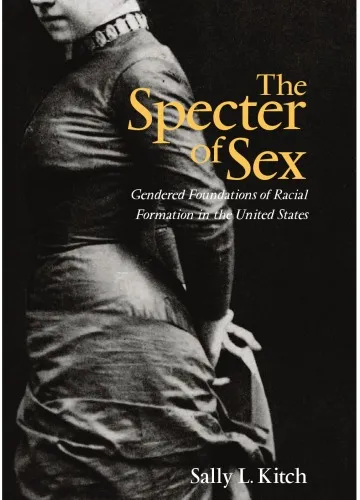The Specter of Sex: Gendered Foundations of Racial Formation in the United States
4.0
Reviews from our users

You Can Ask your questions from this book's AI after Login
Each download or ask from book AI costs 2 points. To earn more free points, please visit the Points Guide Page and complete some valuable actions.Related Refrences:
Introduction to "The Specter of Sex: Gendered Foundations of Racial Formation in the United States"
"The Specter of Sex: Gendered Foundations of Racial Formation in the United States" dives deep into the intersections of race and gender, offering a critical examination of how they have worked together to shape the social, cultural, and political landscape of the United States. Written by Sally L. Kitch, this book is a groundbreaking exploration of the ways in which gendered perceptions have been intertwined with racial categorizations, forming the bedrock of societal hierarchies and inequalities. Through a historical lens, Kitch unpacks the narratives and ideologies that have perpetuated these dynamics, revealing the intricate and often surprising ways in which they manifest across different time periods and contexts.
The central premise of the book is that race and gender are not independent categories of analysis but are deeply entangled in their origins and evolution. Kitch argues that the "specter of sex" haunts racial formation, meaning that ideas about gender and sexuality have continuously underpinned the construction of racial identities and hierarchies. From colonial America to contemporary society, the book traces how myths about gender roles and racial "differences" have been deployed to justify oppression, marginalization, and systemic inequality. Kitch's work is a call to reevaluate not only how we think about racial and gender boundaries but also how they intersect to produce enduring systems of power.
Detailed Summary of the Book
The book begins by dissecting historical moments where gender and race intersected to shape American systems of domination. Kitch delves into European colonizers' encounters with Native Americans, exploring how gendered stereotypes helped construct the image of the "savage" other. The narratives surrounding indigenous women's sexuality were particularly instrumental in shaping both colonial policies and broader racial ideologies.
Moving through key periods in U.S. history, Kitch examines how enslaved Africans were racialized using notions of hypersexuality and physical labor, further reinforced through both legal systems and cultural representations. She also addresses the gendered dimensions of immigration, particularly in relation to Asians and Latinos/as, demonstrating how stereotypes tied to family structures, labor, and sexual morality shaped their racialization.
The book doesn’t merely remain in the past—it transitions into modern discussions, focusing on how contemporary race and gender continue to emerge in various societal debates, ranging from public policies to popular culture. Kitch carefully critiques the ways in which certain gendered expectations, such as the "respectable" femininity required of Black women or the "toxic masculinity" often projected onto men of color, serve to reinforce racial boundaries.
What sets this book apart is Kitch’s insistence on tracing these narratives back to their origins to reveal the repetitive structures underpinning them. By connecting historical and modern contexts, she provides a broader understanding of how race and gender function as interlocking systems of power, simultaneously shaping individual lives and national ideologies.
Key Takeaways
- Racial categories in the U.S. are deeply rooted in gendered ideologies.
- Historical stereotypes about gender and sexuality were used to justify hierarchies of race and class.
- Intersections of race and gender continue to shape contemporary social, political, and cultural dynamics.
- Understanding the past is essential to dismantling present-day systems of inequality.
Famous Quotes from the Book
"The specter of sex has haunted racial formation in America from its inception, influencing how we define, understand, and enforce racial boundaries."
"Gendered images and assumptions were not merely adjuncts to racial ideologies but foundational to them, reproducing hierarchies that persist to this day."
"Race and gender have never been separate strands of identity; they are interwoven threads in a larger tapestry of power."
Why This Book Matters
"The Specter of Sex" is an essential read for anyone interested in understanding the complex ways in which race and gender intersect. It offers a comprehensive and nuanced framework for not only analyzing past injustices but also addressing contemporary challenges. Kitch’s work is a necessary intervention into academic discussions of racial formation, emphasizing the importance of including gender in these analyses.
Beyond the academic realm, this book provides valuable insights for activists, policymakers, and everyday citizens striving to foster a more equitable society. By revealing the historical roots of present-day inequalities, Kitch helps readers see how deeply entrenched these issues are and what is required to dismantle them. This book matters because it challenges readers to think critically about the intertwined histories of race and gender, fostering greater empathy and understanding in the process.
Free Direct Download
You Can Download this book after Login
Accessing books through legal platforms and public libraries not only supports the rights of authors and publishers but also contributes to the sustainability of reading culture. Before downloading, please take a moment to consider these options.
Find this book on other platforms:
WorldCat helps you find books in libraries worldwide.
See ratings, reviews, and discussions on Goodreads.
Find and buy rare or used books on AbeBooks.
1331
بازدید4.0
امتیاز0
نظر98%
رضایتReviews:
4.0
Based on 0 users review
Questions & Answers
Ask questions about this book or help others by answering
No questions yet. Be the first to ask!














